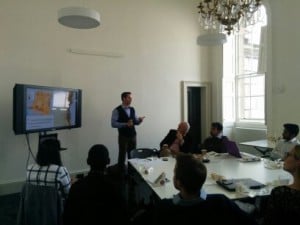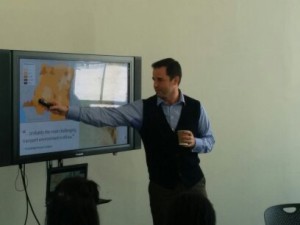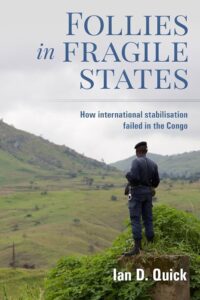Brown Bag Lunch with Ian Quick
 Integrity was delighted to welcome Ian Quick, management consultant and FCAS specialist, to our offices in Somerset House on 17 September. Ian spoke to the Integrity team about his new book, ‘Follies in fragile states’ on the failure of efforts to “stabilise” the eastern Democratic Republic of the Congo.
Integrity was delighted to welcome Ian Quick, management consultant and FCAS specialist, to our offices in Somerset House on 17 September. Ian spoke to the Integrity team about his new book, ‘Follies in fragile states’ on the failure of efforts to “stabilise” the eastern Democratic Republic of the Congo.
Ian’s presentation focused on what he considers to be the five follies – key ways in which international stabilisation efforts in the DRC were maladapted to the context. Understanding how and why they happened can help practitioners and donors gain perspective on past policy failures, with the hope of evolving to do better in future. The talk provided first-hand accounts and reflections on why programming often falls short of expectations in such difficult environments. Ian’s presentation ended with an open discussion regarding lessons learnt and best practices in a context that can be extremely challenging to navigate for external actors.
“A Congolese joke from the Mobutu-era refers to the fictional ‘Article 15’ of the constitution, that urges people to ‘get by on their own’ [referring to the absence of proper governance systems]. It is still very much applicable today.”
 The five follies explored are:
The five follies explored are:
- The makeover fantasy. Grossly unrealistic expectations for the pace at which government institutions could grow and take over new responsibilities.
- Policy without politics. A failure to take seriously the fears, uncertainties and interests that blocked change in sensitive areas like security sector reform.
- Geography denial. Insistence on “scalable” and national-level solutions in a country that was much too large and too diverse for this to be viable.
- The coordination fixation. A prescription for “more planning” that did little to rectify fundamental gaps in the capabilities and willingness of stakeholders to act.
- The iron triangle. The aid industry’s misidentification of “national ownership” with a small clique of officials based in Kinshasa, leaving other stakeholders out in the cold.
The results of these stabilisation mishaps culminated in one of the most significant milestones characterising the DRC’s instability – the fall of the city of Goma to insurgents in November 2012.
A key observation Ian made was that expectations in what we define as progress must be accommodated to the uniqueness of each case. In a context as complex as the DRC, he believes it is unrealistic to hold the progress bar to a ‘Swiss’ standard. As a country with deep-set dysfunctionalities in structural governance, inherited from over a century of misgovernance, the bar to which we measure progress in stability in the DRC should be one of smaller, more realistic steps that could more slowly but still steadily lead the country toward more tangible positive improvement.
In contrast, if one looks at the greater scheme of international stabilisation efforts, the lessons identified in Ian’s book could be applicable to other FCAS contexts. Indeed, many examples of mismanagement or misunderstanding of local complexities can also be applied to other recent examples of international interventions for stability.
On behalf of the Integrity Team, thank you Ian!
The DRC remains a key country for Integrity, with our most prominent active project being the Evidence, Analysis and Coordination Program providing Political Economy Analysis to DFID DRC to help understand the underlying causes, features and dynamics of fragility and conflict in the country.
Ian’s book ‘Follies in fragile states’ can be bought online. The first chapter is available free of charge from the Rethink Fragility website.


